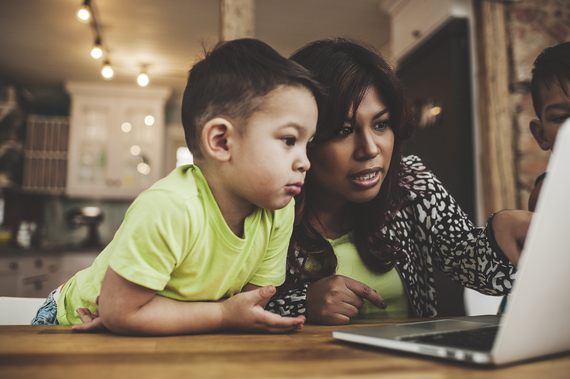You have heard a lot about how much information kids and teens post online from selfies to videos to updates about their day. You have also heard countless stories of kids getting in trouble at school or losing scholarships because of over-sharing online. But what about parents over-sharing? If the recent cover of Time magazine on hyper-connected millennial parents is any indication, parents are spending a lot of time on devices and posting a lot about their lives, including their children. The winter holidays are almost here and many parents will be updating Facebook, Instagram, and YouTube with family photos, videos, and stories. The Family Online Safety Institute (FOSI) wanted to learn more about whether parents are over-sharing and recently conducted a research project with Hart Research Associates, on "Parents, Privacy and Technology Use" to examine how parents model good technology habits for their kids.
Parents' Online Behavior
Our focus groups took place in early September and many parents shared that they posted updates, photos, and even the school's name and location as their kids headed back to school. When asked to reflect more about what they post or their friends post about their kids, some parents started to share examples of over-the-top updates and other parents posting personal information about kids.
Most parents surveyed gave themselves an A or B when asked to grade how they are doing at setting a good example for online behavior, but when we dug deeper, we heard from parents who over-shared information and embarrassed their kids. Some found themselves spending too much time on devices or sometimes just couldn't set restrictions on time or use of technology because they were busy and letting their kids online meant getting a few quiet minutes or hours to get other things done at home.
A few parents even told us how much they liked sharing updates about their kids' accomplishments because social media allowed them to publicly express their pride. One parent really wanted to share videos of her daughter's singing, but stopped herself because she thought about the potential mean comments that might occur from a public posting.
Are Parents' Social Posts Embarrassing?
According to our findings, one in five parents (19 percent), posted something online that their child may find embarrassing in the future, and 10 percent have said their child asked them to take down something they posted online about the child. Luckily only 7 percent said they posted something negative or critical about their child such as bad behavior.
We definitely want to encourage parents to use social media to share life's milestones, accomplishments, and their child's development with friends and family. But, you should also take some time to think about what you are sharing and with whom. Just as you teach your kids that "what goes online stays online," you should also think about what you share. Could the extensive baby pictures or anecdotes about your teen's friendship dramas or bad grades in math embarrass them in the future? Would you be upset if they posted the same information about themselves or their siblings? Who can see your updates, photos, or videos?
What to Consider Before Posting
Whether it is venting about behavior, sharing anecdotes from issues at school or sharing a video of your child doing something silly, take a moment to reflect on whether the content would upset your child or is even sharing too much private information. Some key questions to think about before posting information about your kids on social networks:
•Have I updated or checked my privacy settings lately?
•Is this information public and should I worry about someone else sharing it?
•Should I limit the audience?
•Am I sharing information such as my child's date of birth, school address, location details, or other personal info?
•Would they be upset if someone came across this when they are older?
•Is this story better told over coffee or only to close friends and family?
Learn more about how to use privacy settings on your favorite social networks. There are a lot of ways to limit who can see what on social networks and we have some quick videos to help you navigate the settings so you can restrict what you are sharing to particular groups of friends or just your immediate family.
Use Technology with Your Teen
Ask your teens to help you. FOSI's research found that 39 percent of parents learned something about using online social networks from their child and parents of teens are most likely to acknowledge learning something about technology from their child. If you ask them to help you with your privacy settings and talk about what should and shouldn't be posted online, it helps you think about what you are posting and can also show you what your child already knows about privacy settings and whether they are thinking about their own digital footprint. Our report found that the parents who often use technology with their child are more confident that they can manage their child's technology use -- so take some time this holiday season to learn and explore sites and share social updates together.
(FOSI's latest research project was made possible by a grant from the Digital Trust Foundation. This blog post originally appeared on FOSI's Good Digital Parenting blog.)
